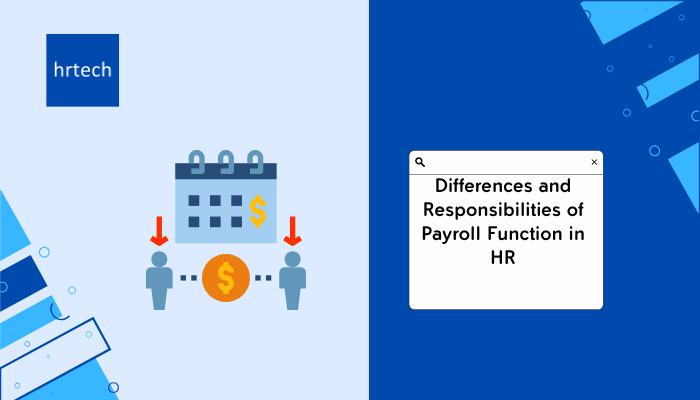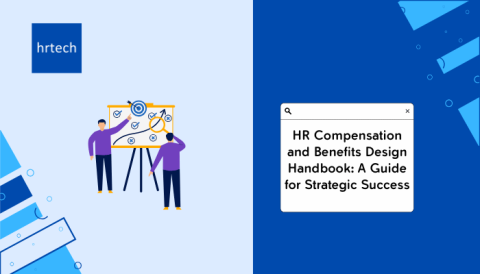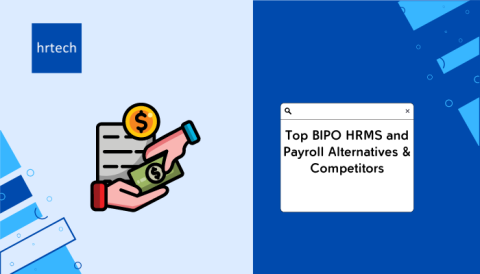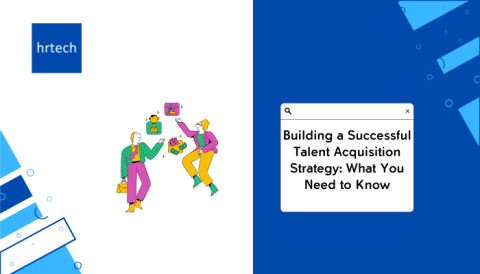The payroll function in HR is essential for any organization, going far beyond simply issuing paychecks. Payroll plays a crucial role in managing employee compensation, tax compliance, and financial reporting. In fact, according to a study by Deloitte, 49% of employees view payroll accuracy as a significant factor in job satisfaction, highlighting its impact on employee morale.
Additionally, a survey by the American Payroll Association found that payroll errors can cost companies up to 1-8% of their total payroll expenses annually. This underscores the importance of a well-organized payroll function in HR, which handles responsibilities such as processing pay, maintaining compliance with labor laws, managing benefits, and supporting financial accountability across the organization.
In this article, we’ll explore the key differences and responsibilities within the payroll function in HR, along with the benefits and challenges it brings to the modern workplace.
What is the primary role of payroll in HR?
The primary role of the payroll function in HR is to ensure that employees are paid accurately and on time, which is crucial for maintaining trust and satisfaction within the workforce. With advancements in Payroll Technology Trends ;this role goes beyond just calculating paychecks; it includes managing every detail involved in employee compensation, from wages and overtime to taxes and deductions.
By keeping payroll accurate and compliant, HR supports both financial integrity and a positive employee experience.
Here’s the primary responsibilities within payroll:
- Ensuring Timely and Accurate Payments: Processes salaries, wages, bonuses, and other earnings to ensure employees are paid correctly each period.
- Handling Payroll Calculations and Deductions: Manages taxes, benefits, and other deductions in line with local, state, and federal laws.
- Maintaining Comprehensive Payroll Records: Keeps detailed records of employee payments and deductions, supporting transparency, compliance, and quick dispute resolution.
Through these tasks, the payroll function in HR not only supports smooth business operations but also fosters a workplace where employees feel valued and fairly compensated.
How Does the Payroll Function in HR Handle Taxes and Deductions?
The payroll function in HR plays a key role in managing taxes and deductions, ensuring that all legal obligations are met accurately and on time. With Automated Payroll Software Benefits, this process becomes more efficient, reducing errors and saving valuable time for HR professionals.
Here’s a breakdown of these responsibilities:
Calculating Taxes and Deductions: The payroll function in HR carefully calculates each employee’s taxes and deductions according to federal, state, and local laws. This ensures compliance with all tax regulations and helps avoid costly penalties.
Withholding for Taxes, Insurance, and Benefits: Payroll withholds necessary amounts from employee earnings for various obligations, including income tax, Social Security, Medicare, and any employer-sponsored benefits, such as health insurance and retirement plans.
Timely Submission of Withholdings: The payroll function in HR ensures that all collected taxes and deductions are submitted to the relevant authorities promptly. This timely submission is crucial for regulatory compliance and reflects positively on the company’s financial management practices.
Through these tasks, the payroll function in HR supports compliance, accuracy, and employee confidence in the organization’s commitment to financial and legal integrity.
Core Responsibilities of the Payroll Function in HR
The payroll function in HR is essential to running a compliant and smoothly operating workforce. With the evolving Role of HR Technology, its core responsibilities range from ensuring accurate payroll processing to upholding confidentiality and managing employee compensation.
Let’s break down each of these responsibilities in a bit more detail:
1. Payroll Processing
The payroll function in HR is responsible for the end-to-end processing of employee wages, covering everything from calculating hours to disbursing final paychecks. This includes regular wages, bonuses, overtime, and any special earnings.
By managing these aspects efficiently, payroll ensures that employees are paid on time and fairly every pay period, fostering trust within the workforce.
- Calculates regular wages, overtime, bonuses, and deductions
- Manages timely and accurate paycheck distribution
- Ensures compliance with payroll schedules and deadlines
2. Ensuring Accuracy
Accuracy is the foundation of a successful payroll function in HR. Any miscalculations can lead to payroll discrepancies, which can cause employee dissatisfaction and compliance risks. The payroll team works meticulously to verify all calculations, from hourly wages and salaries to deductions and benefits, to ensure error-free processing.
- Verifies calculations for hourly, salaried, and bonus payments
- Double-checks tax and deduction accuracy
- Minimizes payroll errors and prevents disputes
3. Maintaining Employee Records
The payroll function in HR keeps comprehensive records of all employee compensation-related information, including payment histories, tax documentation, and deductions. Proper recordkeeping supports compliance, transparency, and easy access to information when payroll-related queries arise. These records also play a crucial role during audits and help maintain accurate financial reporting.
- Maintains detailed records for payments, taxes, and deductions
- Supports audits and regulatory reporting
- Ensures quick access to information for payroll queries
4. Maintaining Confidentiality
Given the sensitive nature of payroll data, the payroll function in HR upholds strict confidentiality standards to protect employee privacy and company security.
Payroll data includes personal financial information and must be handled carefully to prevent unauthorized access or potential breaches. Confidentiality within payroll is not just about following regulations but also about safeguarding employee trust.
- Protects sensitive employee data from unauthorized access
- Prevents potential identity theft or data breaches
- Builds trust within the organization by handling data responsibly
5. Regulatory Compliance
Compliance with local, state, and federal labor laws is a key aspect of the payroll function in HR. Payroll must adhere to minimum wage laws, overtime regulations, and tax withholdings to avoid penalties and maintain legal standing. This responsibility requires the payroll team to stay updated on ever-changing regulations to ensure the organization is fully compliant.
- Follows all labor laws, tax codes, and employment regulations
- Minimizes risk of legal issues or financial penalties
- Ensures ethical practices within payroll management
6. Managing Employee Compensation
Beyond basic payroll processing, the payroll function in HR also manages employee compensation adjustments, such as raises, bonuses, and benefit deductions. When an employee receives a promotion, bonus, or new benefit package, payroll adjusts their compensation to reflect the changes accurately.
This aspect of payroll ensures that employees are compensated fairly and that the organization maintains its commitment to fair and accurate pay practices.
- Adjusts compensation for promotions, raises, and bonuses
- Updates deductions and benefits as needed
- Reflects organizational commitment to fair employee compensation
Together, these responsibilities underscore the critical role of the payroll function in HR, where accuracy, confidentiality, and compliance support both organizational integrity and employee satisfaction.
How Does Integration with HR Systems Improve Payroll Efficiency?
Integration with HR systems, such as HRMS Payroll Solutions, allows the payroll function in HR to streamline data sharing, ensuring employee information such as job status, hours worked, and leave balances are up-to-date for accurate payroll processing.
This alignment helps maintain compliance with HR policies and labor laws, reducing errors and enhancing efficiency across HR and payroll functions.
| Integration with HR Systems | Details |
| Collaboration on Employee Data and Leave Balances | Payroll and HR systems share employee information, such as start dates, roles, and leave balances, to ensure accurate and consistent payroll processing. |
| Ensuring Payroll Aligns with HR Policies and Labor Laws | Payroll is integrated with HR policies and labor laws to maintain consistency and ensure compliance with regulations regarding employee payments and benefits. |
| Managing Employee Changes (Hires and Terminations) | Payroll manages onboarding and offboarding processes by adjusting payroll records accordingly for new hires and terminations. |
| Tracking Benefit Enrollments and Adjustments | Payroll aligns with HR to manage employee benefit enrollments and any benefit changes, ensuring deductions reflect employee choices and adjustments. |
| Automating Tax and Compliance Updates | HR systems integrated with payroll can automatically update tax withholdings and compliance details, reducing manual errors and ensuring regulatory adherence. |
| Real-time Access to Data for Reporting | Integration allows real-time access to workforce and payroll data, supporting accurate reporting, budgeting, and workforce planning for HR and payroll teams. |
| Managing Overtime and Shift Differentials | Payroll tracks overtime and shift-based pay adjustments directly from HR schedules, ensuring accurate payment for additional work hours or different shifts. |
Payroll and Employee Management
The payroll function in HR is closely intertwined with employee management, as it involves not only processing pay but also responding to employee queries, handling compensation adjustments, and ensuring accurate time tracking.
With the support of Automated HR and Payroll Systems, this function enhances transparency and employee satisfaction by addressing payroll-related concerns quickly and maintaining confidentiality, which is critical for trust.
Additionally, payroll is responsible for updating compensation and benefits to reflect role changes, promotions, or new benefits enrollments, ensuring that employees are paid according to their updated status within the company.
Here’s how the payroll function in HR contributes to effective employee management:
- Responding to Payroll Queries and Maintaining Confidentiality: Payroll teams handle employee questions regarding pay, deductions, and benefits, maintaining confidentiality throughout to protect personal information.
- Managing Compensation Changes and Benefits Adjustments: Reflects changes in employee compensation due to promotions, raises, or benefits adjustments, ensuring pay aligns with current roles and policies.
- Tracking Working Hours and Producing Accurate Pay Slips: Monitors employee hours and attendance records to produce accurate pay slips, which detail earnings, deductions, and other important information for employee reference.
By supporting clear communication and accurate records, the payroll function in HR enhances employee satisfaction and builds trust in payroll processes.
Reporting and Accounting Responsibilities
The payroll function in HR plays a key role in generating accurate financial reports and managing payroll-related accounting entries, ensuring that all payroll expenses align with the organization’s financial records.
This responsibility includes reconciling payroll data, preparing general ledger entries, and handling year-end reports to maintain transparency and support compliance with financial regulations.
| Reporting and Accounting Responsibilities | Description |
| Reconciling Payroll Entries and Remittances | Matches payroll records with actual payments to catch and resolve discrepancies, supporting accurate financial records. |
| Generating General Ledger Entries with Data Accuracy | Inputs payroll expenses into the general ledger, ensuring data aligns with company financials and is audit-ready. |
| Handling Year-End Payroll Calculations and Compliance Reports | Prepares for year-end by calculating taxes, issuing W-2 forms, and submitting compliance reports on time. |
| Tracking Payroll Liabilities | Monitors payroll liabilities like tax withholdings and benefit contributions, ensuring timely payments to appropriate authorities. |
| Managing Payroll-Related Audits | Prepares payroll records for internal or external audits, ensuring transparency and readiness for review. |
| Updating Financial Forecasts Based on Payroll Data | Provides accurate payroll data to finance teams for more precise budgeting and forecasting. |
Challenges and Considerations in Payroll Handling by HR
The payroll function in HR faces unique challenges due to the technical and collaborative nature of the role. Managing payroll requires HR professionals to have a strong grasp of accounting principles, as any oversight in calculations or tax deductions can lead to costly errors.
Payroll’s overlap with finance creates a risk of mistakes if tasks and responsibilities aren’t clearly delineated. Additionally, effective communication between HR, finance, and IT is essential to ensure smooth payroll operations without misunderstandings. Here’s a breakdown of the primary challenges:
- Accounting Knowledge: HR professionals must understand key accounting concepts for accurate payroll processing and financial reporting.
- Error Risks: The overlap between HR and finance functions can lead to payroll errors if roles aren’t well-defined, affecting payroll accuracy and compliance.
- Communication Gaps: Miscommunication between departments, especially HR and finance, can delay payroll tasks or create data inconsistencies.
These considerations highlight the need for HR to combine financial skills with effective communication and technical expertise to manage payroll smoothly and compliantly.
Benefits of HR Managing Payroll
When the payroll function in HR is managed efficiently, it offers significant advantages for both the organization and its employees. However, like any critical function, there are inherent risks that need to be managed carefully. Let’s dive deeper into the benefits and risks of HR handling payroll, supported by some key facts and figures.
1. Employee Satisfaction
When employees receive accurate, timely paychecks, their trust in the company grows, leading to greater job satisfaction and engagement. Payroll managed within HR strengthens this link by ensuring that employees are compensated fairly and that any adjustments, like bonuses or deductions, are accurately reflected in their pay.
According to a survey by the American Payroll Association, nearly half of employees consider payroll accuracy essential to their job satisfaction.
- Builds employee trust through timely, accurate payments
- Reduces payroll-related disputes and enhances morale
- Contributes to long-term employee retention and engagement
2. Compliance
An HR-managed payroll function, especially with a robust HRMS, can streamline compliance with labor laws and tax requirements. By automating updates to reflect changes in local, state, and federal regulations, HR can help avoid legal issues.
Non-compliance with labor laws can be costly U.S. labor violations resulted in $234 million in back wages in 2020. An HR-integrated payroll function ensures that employee compensation meets all legal requirements, reducing the risk of fines and protecting the company’s reputation.
- Automates updates for federal, state, and local labor laws
- Minimizes risk of penalties for non-compliance
- Supports ethical payroll practices within the organization
3. Reporting and Analytics
With advanced payroll software, HR can generate insightful reports on labor costs, overtime, benefits, and other workforce expenses. These insights enable HR and finance to make data-driven decisions that align with organizational goals. A recent PwC survey noted that 73% of HR leaders rely on analytics for budgeting and forecasting. By integrating payroll data into HR systems, companies can better plan their budgets and manage resources effectively.
- Provides insights into workforce costs for budgeting
- Assists with forecasting for strategic workforce planning
- Helps identify trends in labor expenses, including overtime
4. Time and Cost Savings
Automation within HR-managed payroll systems reduces manual processes, saving time and lowering operational costs. By minimizing repetitive tasks, HR teams can focus more on strategic priorities, such as employee engagement and development.
Research shows that companies using automation in payroll see an average 20-25% reduction in labor costs. Automating payroll reduces administrative work, boosts productivity, and improves the overall efficiency of the HR department.
- Reduces time spent on manual payroll tasks
- Lowers labor costs through automation
- Frees up HR resources for strategic initiatives
Risks of HR Managing Payroll
The risks of HR managing payroll include the potential for data breaches, given the sensitive employee information payroll holds, which could lead to legal and reputational issues. Additionally, payroll errors or fraud, such as miscalculations or unauthorized payments, can result in costly financial losses and reduced employee trust if not properly managed.
1. Data Security
Payroll data contains highly sensitive information, making it a prime target for data breaches. A payroll breach can lead to financial losses and damage the company’s reputation, not to mention a loss of employee trust. The Identity Theft Resource Center reported over 1,100 cases of payroll data breaches in 2022 alone.
Protecting payroll data requires secure access controls, encryption, and routine audits to prevent unauthorized access and safeguard employee information.
- Contains sensitive employee data (financial and personal)
- Requires robust security measures to prevent breaches
- Essential for maintaining employee trust and regulatory compliance
2. Payroll Fraud
Payroll fraud, including false claims, identity theft, or embezzlement, poses a significant risk, particularly in companies without strict internal controls. The ACFE estimates that payroll fraud occurs in about 27% of organizations, leading to financial and reputational damage. Preventing payroll fraud involves establishing strict access controls, regular audits, and segregation of payroll duties within the HR department.
- Includes risks of embezzlement, false claims, and identity theft
- Requires strict internal controls and regular audits
- Can lead to substantial financial losses if not managed
3. Accuracy and Precision
Errors in payroll calculations, even small ones, can have significant consequences, leading to potential disputes and legal issues. A recent Ernst & Young study found that payroll errors can cost companies up to 1-8% of total payroll expenses annually.
Ensuring accuracy in payroll is essential for compliance and for maintaining a positive relationship with employees. Regular audits, automated calculations, and double-checking deductions help HR avoid costly errors.
- Potential for costly disputes and legal issues
- Requires precise calculations and verification processes
- Essential for maintaining compliance and employee satisfaction
Conclusion
The payroll function in HR is a critical bridge between HR’s focus on employee satisfaction and finance’s emphasis on accuracy and compliance. Effective payroll management relies on close collaboration between HR and finance departments to ensure that payments are both accurate and aligned with company policies and employee expectations.
Evaluating an organization’s structure and specific needs is also key to determining the best strategy for managing payroll. Whether it’s in-house payroll management or outsourcing, aligning the approach with the company’s goals, size, and resources allows the payroll function to operate efficiently and in alignment with business objectives. A well-integrated payroll system can save the organization time and reduce administrative burdens, creating a more streamlined workflow.
Looking to take your payroll function to the next level? Explore our marketplace for top-rated hrtech solutions that can streamline your payroll processes and help you stay compliant and efficient.





